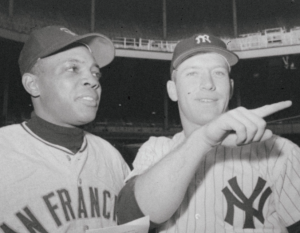My friend, Don Drooker, wrote about Jackie Robinson last week. Why? What, are you living under a rock? Robinson broke the color barrier in Major League baseball on April 15, 1947.
That is appalling, as every baseball fan knows. And really as anyone who has thought about the history of the United States knows. But that is what happened, and we rightfully celebrate the end of the barrier. It would certainly be wrong not to, at least until all the ancillary misery of racism has been fixed.
I think about the slogan, Make America Great Again, and it is difficult to think of it as meaning anything other than that we were a better country when we were whiter and had more slaves, or at least fewer civil rights laws. My friend Don’s piece reminded me of something.
I was young. Maybe 6, could be 7. My friends and I collected baseball cards. We were crazy about baseball cards, really. And we played games. The most popular baseball card games we played were built on the rules of the card game War.
You would lay down a card, at random, and another player would lay down a card at random. If they matched, the other player would take your card. If they didn’t match, the next player would turn a card, and so on until a match was made.
Matches were made with logo colors, team names, positions. We had a lot of variations of the game. This was a way to mix up our card collections, which we didn’t see as having monetary value, but we did see as currency of a baseball fandom sort.
And then, one day, we decided to play the same game, but using player skin color as the determinant for matches. What I can say for sure is none of us six year olds thought skin color meant anything other than the color of skin. There were no other signifiers for us. We saw it as natural a swap as your yellow logo versus my yellow logo. So we sat on the stoop of my friend’s house playing this game, when my friend’s mother heard what we were doing. Matching on skin tones. Boom.
Everyone had to go home. This was unacceptable.
I think back and I don’t blame my nameless friend’s mom. She was telling us race is not a game.
But she wasn’t telling us that race is in the eye of the beholder. It is a power system. And our innocent heads, up to that point, didn’t see skin color as anything other than skin color. A shade.
Later, we learned how much more there was to it.



